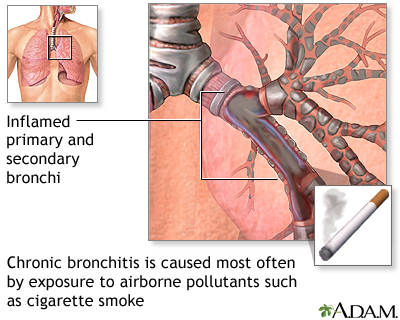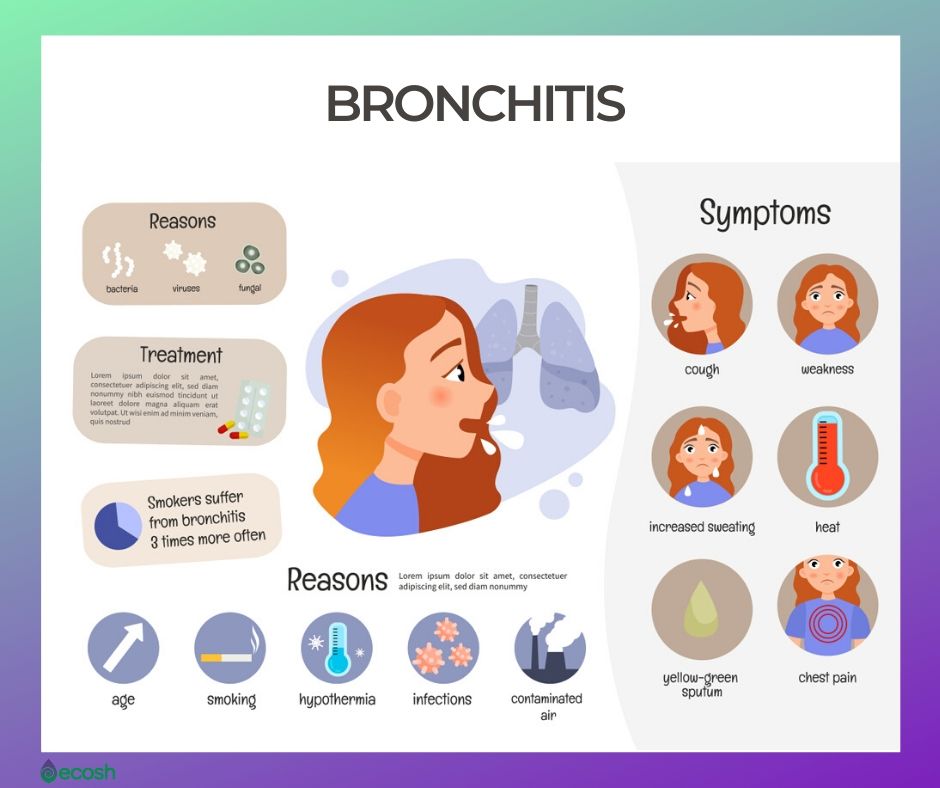Bronchitis Causes

Bronchitis is an inflammation of the bronchial tubes. The cause of a bronchitis cough may be a virus or something inhaled that irritates the lungs. While a bacterial infection or a viral infection are possible, bronchitis usually does not result in permanent breathing problems. The symptoms will last from seven to ten days and often clear up on their own without medical intervention. The condition most commonly affects the elderly and young children, as well as people with certain health conditions.
The first symptom of bronchitis is a cough. It will be red and irritated and will eventually scar. The mucus from the lungs will change color, which means that the body’s immune system is working. If you cough for more than a couple of weeks, you may have a more serious ailment. In this case, it’s essential to visit a doctor.
A cough that produces white or yellow sputum is usually the first symptom of bronchitis. Other symptoms include shortness of breath, aches and pains, and a general feeling of illness. A cough that doesn’t clear up on its own may indicate that you’re suffering from acute bronchitis. If you have a chronic bronchitis, the infection may lead to pneumonia. In about one in every 20 cases, pneumonia is a life-threatening condition.
Acute bronchitis is a condition in which the lining of the bronchi is inflamed. It can lead to scarring and irritation of the inner mucosal membranes. In addition to inflammation, mucus-secreting pulmonary glands will undergo hypertrophy, leading to thickened bridging of the bronchial wall. In addition, you’ll also experience changes in the epithelium.
Acute bronchitis is caused by an infection of the inner walls of the lungs. The inflammation leads to irritation and scarring of the bronchial walls. In addition to inflammation, bronchitis causes shortened and choking, shortness of breath, and chest pain. These symptoms are caused by the narrowing of the trachea, which is responsible for the obstruction of airflow.
Acute bronchitis is an infection of the inner lining of the lungs, resulting in an inflamed cough. Acute bronchitis is a virus, which typically causes 90% of cases. Viruses can cause bronchitis through a number of methods, including smoking and exposure to dust and fumes. In some cases, the lungs can be infected with bacteria.

The most common type of bronchitis is chronic, and it lasts for three to four weeks. It can be caused by an infection or cigarette smoke. It can affect people of all ages and genders and can lead to lung damage. As the airways become narrow, a cough can also be an ailment. While a cough is not a symptom of a chronic bronchitis, it is the most common symptom.
Symptoms of bronchitis are different in every person. The most common symptom is a dry cough. In some cases, small amounts of white mucus may be coughed up. If the bronchitis is bacterial, green or yellow mucus is coughed up. The cough lasts for weeks. It is a sign of an inflamed lungs.
A cough caused by bronchitis is called productive bronchitis. It is characterized by wheezing or wheezing in the chest. Cough may be accompanied by fever, sore throat, chills, and general malaise. Acute illness usually lasts three months or less and is more common in older patients.
Acute bronchitis can be caused by a virus. If you are susceptible, consider getting a yearly flu or pneumonia vaccination. These vaccinations will help protect you from bacterial and viral infections. Washing your hands regularly will help reduce the risk of infection. Alcohol-based hand sanitizers are also great for preventing bronchitis. The health website https://codewebdao.com/
can recommend medications to treat bronchitis and help you manage your symptoms.
Acute bronchitis usually goes away on its own in two to three weeks. Symptoms of chronic bronchitis can persist for several months. Although the cause of bronchitis is not fully understood, it is possible to prevent the recurrence of the infection by preventing it. Acute bronchitis is an unpleasant condition that usually goes away on its own. If you have been exposed to smoke, refrain from smoking. Despite the discomfort, the cough is not considered serious.
